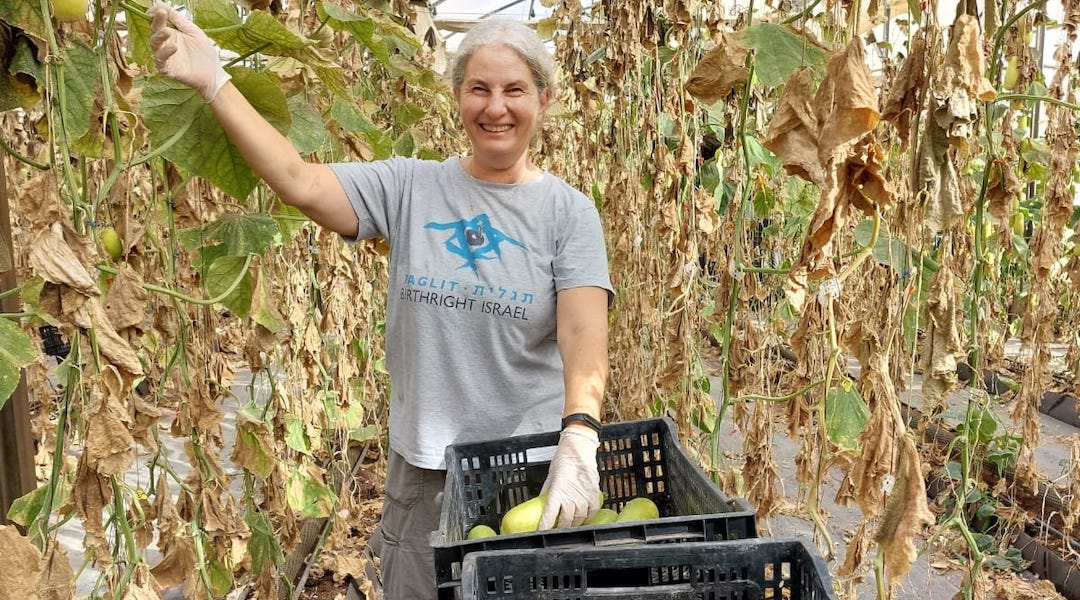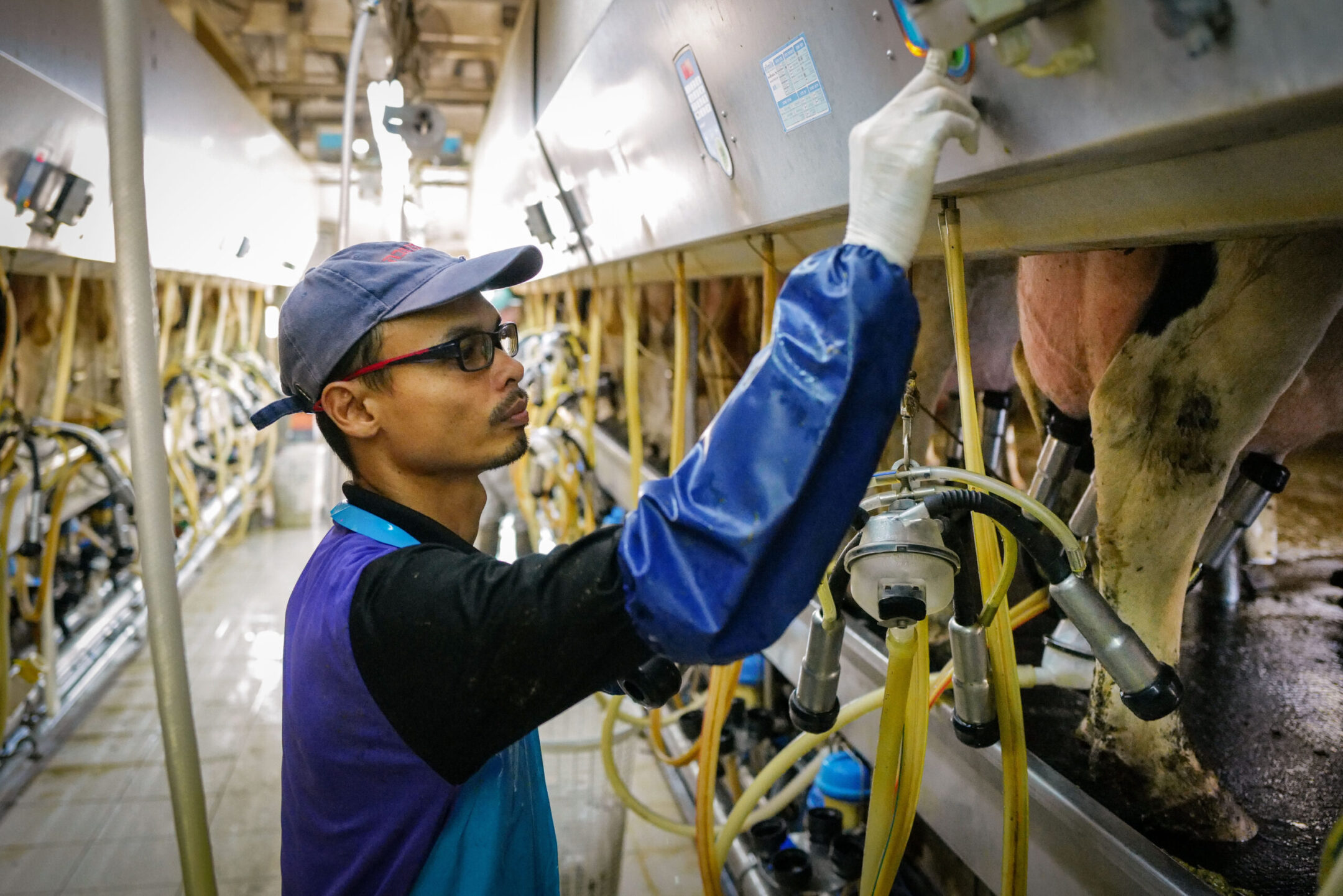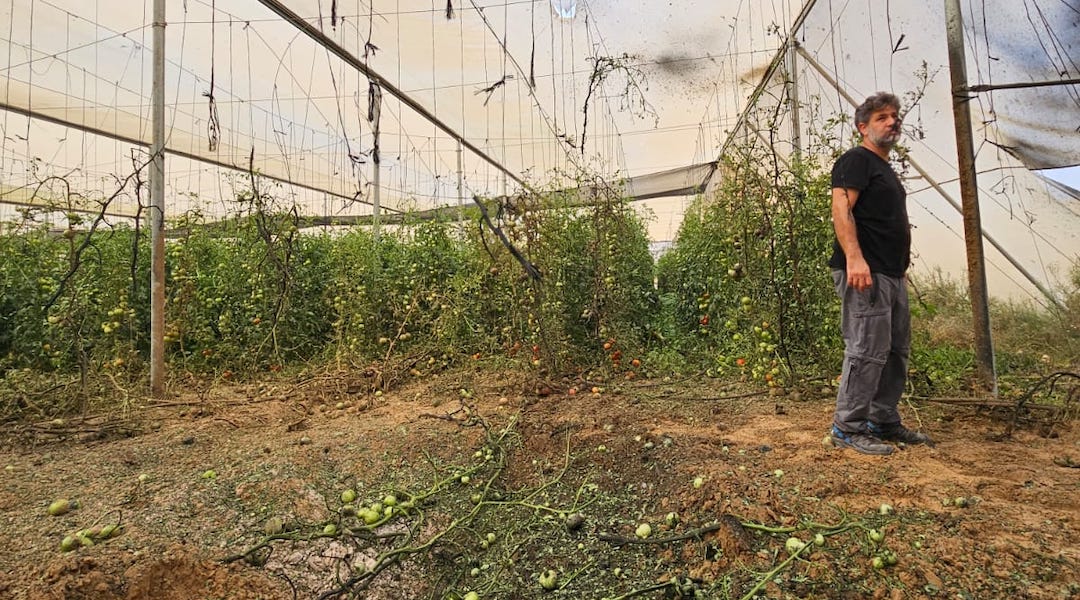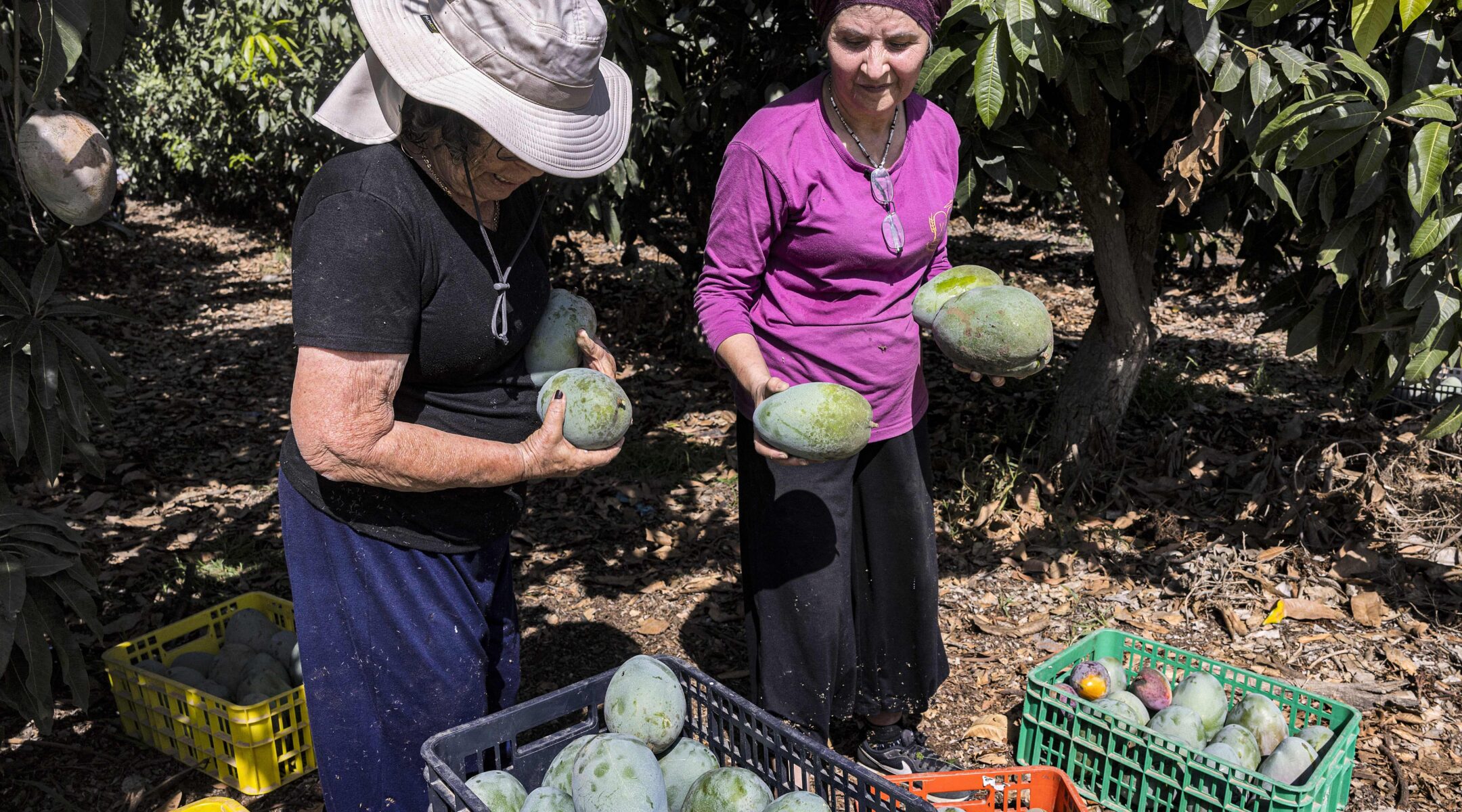TEL AVIV (JTA) — By now, the dramatic rescue of Amir Tibon’s family from Kibbutz Nahal Oz by his 62-year old father, retired IDF General Noam Tibon, has become one of the most widely shared stories of Oct. 7.
Lesser known but also heroic is the tale of another of Tibon’s family members, Dudik Laniyado, who put on his army uniform and sped into the line of fire to tend to the cows that were abandoned that day.
Laniyado, who is Noam Tibon’s brother-in-law, is a dairy farmer at Kibbutz Kalya near the Dead Sea. Amid the news of the massacre, he heard from Tibon’s rescue mission that the cows of Nahal Oz and other farms near the Gaza border were at risk.
“Dairy cows can live without being milked for one or two days,” said Laniyado, but then they begin to dry out, a process that cannot be reversed. Going longer without being milked can cause injury and death.
When he arrived at the closed military area on Oct. 9, he found that Hamas terrorists had destroyed the milking area and the equipment used to feed the cows. Under fire from nearby gun battles, he opened all the gates on the farm and let the baby calves out of their cages, letting them move around for the first time in days and eat food that he gathered from a local agricultural center.
“We got to a place that is a war zone,” he said. “There is enormous destruction to all the farms near the border area.”
Laniyado was an early arrival to what has become a new passion for Israelis, one they say is nearly as vital to southern Israel’s future as the country’s war on Hamas in Gaza: tending the farms, animals and fields that have been left fallow by the massive disruption of Oct. 7 and its aftermath.
Thousands of Israelis have signed up to work the fields and pens, joining regional Whatsapp groups that place local farmers and volunteers where they are most needed. Slots fill within minutes as volunteers trek from their urban homes to pick crops whose regular workers are dead, departed or unable to enter the country.
Popup farmers markets in city centers are packed with customers seeking to spend their money to help growers whose work they know has been upended. Help is even coming from overseas: Birthright Israel has even called upon its 850,000 alumni around the world to fly to Israel for volunteer opportunities that include picking fruit and vegetables.
Like the hundreds of thousands of Israelis who have joined the military reserves, the volunteers are stepping in for a depleted workforce — and hoping that the region has a future after the guns stop blazing.
“What happened on [Oct. 7] was a kind of local Holocaust. Its effect could be a holocaust on the economy here,” said Dudi Alon, who is the deputy head of the Gaza border’s Eshkol Regional Council. He is among the few farmers and security staff remaining at his home of Moshav Yated, just east of the Kerem Shalom border crossing into Gaza.
“There are people who think we are all soldiers now and anyone who comes to help here is like a fighter,” he added. “On the other hand, there are those who think it is a moral problem if you risk the lives of volunteers and farmers to work fields under fire.”

Sara Goldsmith, who lives on a kibbutz in Israel’s north. volunteering on a farm in southern Israel. (Courtesy of Sara Goldsmith)
Surveying his region, Alon believes Hamas aimed to destroy southern Israel’s agriculture along with its population. Gaza-area farms, he said, produce 70% of Israel’s tomatoes and 30% of its potatoes in addition to other vegetables and dairy products, and rely on a legion of foreign workers.
Before Oct. 7, he said, the Eshkol Regional Council had 4,000 workers from Thailand who were experienced at farm work. Dozens of Thai workers were murdered on Oct. 7, and dozens more are hostages in Gaza. Most of the rest flew home to their country, leaving fewer than 1,000 now, a loss Alon calls “a death knell to agriculture here.” (Guest workers from Gaza also contributed to the workforce.) Farms’ planting cycles can last up to eight months, making it harder for them to restart production if they’ve been abandoned.
“Hamas intentionally kidnapped and murdered foreign workers in order to frighten the foreign workers to ruin the economy here and they succeeded,” said Alon. “Many incredible volunteers are coming to help and support us, [but] at the end of the day there is work that is physically difficult and requires special skills that cannot rely on volunteers.”
Many of the area’s residents have been evacuated by the government to safer regions of the country, but a few have remained. Evie Atiya, who lives in Moshav Pri Gan and is still there, recounted that “10 terrorists entered on bikes and started to shoot at houses” on Oct. 7, killing four residents and trapping the entire village in their shelters for 48 hours before they were evacuated by the army.
Shortly after leaving his shelter “terrified,” Ataya learned that the Thai embassy had evacuated more than half of all the farm workers in the area and that only seven of his farm’s 24 workers remained.

A worker milking cows at a cowshed in the Golan Heights in Israel’s north, Oct. 26, 2023. (Michael Giladi/Flash90)
“Everything has collapsed,” he said. And while the government has long provided financial assistance to the area’s farmers, the perceived insufficient response from the finance and agriculture ministries — matching the long hours residents waited in shelters before the army’s arrival — is symbolic of many Israelis’ widespread disillusionment with the country’s leadership following Oct. 7.
“It seems like they weren’t ready for this,” he said, adding that it feels like “they are trying to help but that they are lost.”
Eitan Aharon, secretary of Moshav Mivtahim in the Eshkol Regional council, recently told the Israeli publication Zman Israel, “I am afraid farmers will commit suicide” before help arrives.
On Wednesday, Israeli Prime Minister Benjamin Netanyahu defended his government’s record on financial assistance to impacted communities. At a cabinet meeting, he announced that the government had budgeted nearly $3.4 billion in supplementary funds to help evacuees and local governments in the south and north in November and December.
“I want to sharpen the point on the financial sum we are going to bring for the benefit of Israel’s citizens,” he said. “We have already spent many billions to help the evacuees, to help the families of the kidnapped and missing, to help the authorities in the north and south, the reservists, businesses. But we are going to bring much more.”
Some government efforts are already being felt: On Thursday, the Ministry of Agriculture plans to convert Jerusalem’s Cinema City mall into a market for farmers from the south and north.
Maaya Arfi works at HaShomer HaChadash, an Israeli organization helping connect Israelis to the land through agriculture. It was one of the first groups to raise the alarm about the labor need and continues to organize efforts to assist Israeli farmers.

A local farmer stands in a field in southern Israel. (Eliyahu Freedman)
“In the next two weeks we can already be at 4,000 volunteers a day,” Arfi said of her organization’s initiative, which matches Israelis with farmers in need via a hotline and phone application.
While the precise number of volunteers is unknown, a new poll of Israelis by Tel Aviv University and Ben-Gurion University of the Negev found that more than 40% of respondents had volunteered in some form in the third week of the war.
Some volunteers have come from other Israeli farming communities. Sara Goldsmith, a 57-year old tour guide from Kibbutz Sde Eliyahu, said volunteering to help farmers in the south was keeping her mind off her canceled business.
“October, November and December are peak season for tourism in Israel, and overnight I lost all my groups that I was supposed to be having,” she said. “It’s a very difficult time for all the tour guides across Israel and many are doing what I’m doing: helping out wherever we can. We don’t know when our income is coming in but we have hands and the will to volunteer.”
On Monday, she traveled with a group of approximately 20 members of Kibbutz Sde Eliyahu — ranging in age from 15 to 80 — to help at Kibbutz Saad, which Sde Eliyahu had “adopted” following the outbreak of the war. Saad, which like Sde Eliyahu is a religious kibbutz, was fortunate to have its gate closed on Oct. 7 for Shabbat and was largely spared the worst of Hamas’ attack. It instead endured its own kind of trauma, becoming a makeshift morgue, refuge and clinic for the victims of the massacre, especially those who escaped from the Nova music festival at the nearby community of Re’im.
At the kibbutz, Goldsmith helped pick cucumbers grown for their seeds, rather than for eating. Goldsmith’s children have also enlisted in the war effort: Her daughter is serving in the military reserves and her son flew back from his home overseas to work full-time on a farm on the Gaza border.
“We are in a helpless situation,” she said. “So when you do something you feel a little less helpless.”
Another volunteer named Yael, who declined to share her last name out of privacy concerns, traveled from Tel Aviv to Moshav Yesha near Gaza last Saturday with a few friends and work colleagues from a Tel Aviv hospital to harvest tomatoes, passing military checkpoints and torched cars along the way. Working in the fields, she said, was particularly unnerving where there is “no safety gear and there are no shelters in the farms” to protect them from barrages of Hamas rockets, which largely target the south.
Her fear wasn’t misplaced. During her shift, Yael heard “really big booms quite close” coming from Israeli airstrikes on Gaza. And at one point, she recalled, she looked around and “I just suddenly see people on the ground, and stood there frozen waiting for it to end.”
When her shift ended a few hours later, the farm owner showed her a crater from a rocket launched by Hamas that had just struck another part of the greenhouse, causing damage only to the tomato plants.
Those dangers have led some people to flee the south. But Atiya says that no matter what happens, he is determined to stay and work the land.
“Somebody needs to be here and make food from this land and this is what I do. It’s not a choice if I am going back there,” he said. “This is my land, this is my house, everything that I know.”
Laniyado agrees that the government is flailing but said that conversations with the young soldiers in the area left him optimistic. According to some accounts, soldiers have tended greenhouses that were abandoned on Oct. 7.
“I joked with them and talked with them,” Laniyado said. “I believe with complete faith that we will win the war, that we will re-establish the villages, the agriculture will return to what it was and we will learn a lesson and unite around the fact that we are all Jews and that we have no choice. We are dependent on each other.”
JTA has documented Jewish history in real-time for over a century. Keep our journalism strong by joining us in supporting independent, award-winning reporting.






